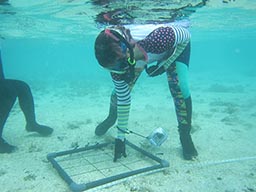- ABOUT US
- PROGRAM AREAS
- CONSERVATION APPROACH
- EDUCATION
- MULTIMEDIA
- Participation in coral reef activities
- Perceptions of resource conditions
- Attitudes toward coral reef management strategies
- Awareness and knowledge of coral reefs
- Cultural importance of coral reefs
- Awareness of coral reef rules and regulations
- Pro-environmental behaviors
- National Coral Reef Monitoring Program: Understanding Socioeconomic Connections
- National Coral Reef Monitoring Program (NCRMP) Data Visualization Tool
- National Coral Reef Monitoring Program Socioeconomic Monitoring Component: Summary Findings for Puerto Rico, 2022
- National Coral Reef Monitoring Program Socioeconomic Monitoring Component: Summary Findings for USVI, 2017
- Global SocMon: The Critical Roles of Socioeconomic Data in Coral Reef Monitoring
Socioeconomic Monitoring in the Caribbean: Travels to the U.S. Virgin Islands and Puerto Rico
By: Mary Allen, Ph.D., CRCP Socioeconomics Coordinator
Takeaway: NOAA’s National Coral Reef Monitoring Program (NCRMP) Socioeconomic Component gathers and monitors a collection of socioeconomic data in seven U.S. coral jurisdictions. Recently, the team traveled to the U.S. Virgin Islands (USVI) to meet with partners and prepare for the 2025 USVI Survey, as well as Puerto Rico to present results and trends from the 2022 Puerto Rico Survey.

Coral Reef Ecosystems: Valuable and Threatened
Social science is critical to understanding the connections between humans and coral reef ecosystems. This is important because coral reefs provide a variety of benefits to people such as recreation, tourism, seafood, cultural heritage, and much more. Likewise, people play a central role in protecting coral reef ecosystems to sustain these benefits, while fostering their relationships with nature. Recognizing that people are part of the wider ecosystem, NOAA’s National Coral Reef Monitoring Program (NCRMP) is one of the only programs in the world that integrates human dimensions into coral reef ecosystem monitoring. As a whole, NCRMP provides a holistic understanding of how our coral reefs are doing, as well as how our coastal communities who depend on those reefs are doing.
The Socioeconomic Component of NCRMP collects data to answer questions such as: What is the status of human knowledge, attitudes, and perceptions regarding coral reefs? And, how are human uses of, interactions with, and dependence on coral reefs changing over time?
Therefore, this information is collected through surveys of residents each year in one of the seven inhabited U.S. coral reef jurisdictions: Florida, U.S. Virgin Islands, Puerto Rico, American Samoa, Hawai’i, Guam, and the Commonwealth of the Northern Mariana Islands. The survey is repeated in each jurisdiction every 5-7 years to help us understand how socioeconomic conditions are changing over time. The survey collects data on seven indicators:
The NCRMP Socioeconomic Team is led by Dr. Mary Allen (NOAA Coral Reef Conservation Program) in partnership with NOAA National Centers for Coastal Ocean Science social scientists, Chloe Fleming and Amanda Alva. The team works with local management partners and communities throughout a survey project to ensure that results are informative to local management needs for coral reef conservation.

In November 2023, the team traveled to the U.S. Virgin Islands (USVI) and Puerto Rico where they met with partners to prepare for a new survey cycle and close out another. They first visited St. Croix and St. Thomas, USVI to work with partners in preparation for the 2025 NCRMP USVI Socioeconomic Survey. The NCRMP Survey is a national, standardized instrument used to measure socioeconomic changes over time. However, because each jurisdiction is unique, the team collaborated with USVI partners to develop survey questions that are tailored to the local context, culture, and languages. Local partners also advised on the sampling design to help ensure that the survey results will be representative of USVI’s resident population, as well as each population on the individual islands of St. Croix, St. Thomas, and St. John. This process helps ensure that a variety of voices are included in the survey and results.

The team then traveled to San Juan, Puerto Rico to present the results from the 2022 NCRMP Puerto Rico Socioeconomic Survey. Because this was the second monitoring survey completed for this region, results also include trends between 2015 and 2022. Overall, the results indicate that Puerto Rico residents have important human connections to coral reefs and rely on these ecosystems for a variety of cultural and socioeconomic benefits. Results also suggest that residents want to see efforts to mitigate threats (e.g. pollution) to coral reefs and prevent resource conditions (e.g. ocean water quality, amount of live coral) from becoming worse. The full report, infographics, and data for the 2022 Puerto Rico NCRMP Socioeconomic Survey are now available here: https://www.coris.noaa.gov/activities/ncrmp_socio_pr_2022/welcome.html

This socioeconomic monitoring program would not be successful without local partnerships. We are thankful for the opportunity to meet with local partners, and look forward to continuing to collaborate on integrating human dimensions with coral reef management. Stay tuned for more updates from the NCRMP Socioeconomic Team!
Related Stories and Products
About Us

The NOAA Coral Reef Conservation Program was established in 2000 by the Coral Reef Conservation Act. Headquartered in Silver Spring, Maryland, the program is part of NOAA's Office for Coastal Management.

The Coral Reef Information System (CoRIS) is the program's information portal that provides access to NOAA coral reef data and products.
Work With US
U.S. Coral Reef Task Force
Funding Opportunities
Employment
Fellowship Program
Contracting Assistance
Graphic Identifier
Featured Stories Archive

Access the archive of featured stories here...
Feedback
Thank you for visiting NOAA’s Coral Reef Conservation Program online. Please take our website satisfaction survey. We welcome your ideas, comments, and feedback. Questions? Email coralreef@noaa.gov.
Stay Connected
Contact Us
NOAA’s Coral Reef Conservation Program
SSMC4, 10th Floor
1305 East West Highway
Silver Spring, MD 20910
coralreef@noaa.gov
